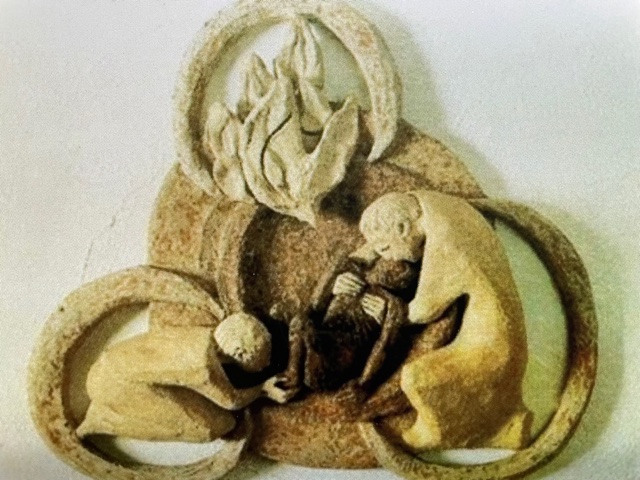
The Triune God
For a year we thought about “unity”. In doing so, we orientated ourselves on the Holy Scriptures, on the times and festivals of the church year, as well as on experiences of a human and Christian life in general. If you want, you are welcome to look again at the individual topics that we have dealt with over the course of the year.
I would like to ask you the following question: Could you imagine discussing our considerations with someone who does not believe in God? My answer: I think so. Because our thoughts on unity will also be understood and affirmed by people who live without religion.
But as much as our topics can be experienced in everyday human life so far, I would like to focus on God on the last day of the month today, on the three-one God.
Trinity – a secret that says a lot
When we talk about the Trinity, we quickly say: It is a secret of our faith. That is also true, because we cannot explain this secret. I checked my sermons on Trinity Sunday. Then I spoke about what the Trinity does (Creator, Redeemer, Comforter and Companion) and how to thank and honor it. Today I want to reflect with you about what the Trinity is like: one God in three persons. Or as it says in the preface: With your only begotten Son and the Holy Spirit you (God the Father) are one God and one Lord.
Monarchy or coalition
Allow me to take a look at politics. Imagine being a queen or a king. Kings were sole rulers, did not need to ask anyone and could make self-important decisions, sometimes really as the mood took them. With tyrants and dictators, the peoples have often had to experience this painfully. Different in a democracy. Here people can choose who should rule them. And since there is not always an absolute majority, coalitions are formed. So imagine if you had to form a government and were looking for a coalition partner or two. You have to look for a partner, get to know him better, listen to what he wants, make compromises, keep looking for a dialogue after differences of opinion, and sometimes for the sake of the community forego some personal profiling (humility). Can you discover the Triune God there..?
Mission and obedience
We find further thoughts on the unity of God in the farewell speeches of Jesus in the Gospel of John. Jesus then prays for the unity of his disciples: All should be one just as we are one, I in you and you in me (Jn 17:21). Jesus had already spoken about what his union with the Father looks like: I did not come to do my own will, but the will of my Father. Unity with the Father is shown in his mission and obedience to the will of the Father. And this is not a blind or forced obedience, but a voluntary and loving obedience.
Give testimony
Closely related to his mission is the commission to bear witness of the love of the other. This is said both of Jesus, who testifies of the love of the Father, and of the Holy Spirit, who testifies of Jesus. Jesus gives an impressive testimony when he stands in front of the Roman governor Pontius Pilate: This is why I came into the world to bear witness to the truth (Jn 18:37). For Jesus, the truth is God’s unconditional love for people. For this truth he lived and even dies for it.
They should be one for the world to believe …
A look back at church history could make one pensive. The dark chapters are not just the time of the Crusades or the machinations of the Inquisition and the witch trials. Just as dark are the times when Christians quarreled and even fought with one another. I am thinking of the separation of the Orthodox Church (1054), the Reformation (1517), the schisms within the Catholic Church, where there were suddenly two popes, and of course the terrible religious wars such as in Ireland. These are testimonies that make it difficult to believe.
The balls – a lesson from God for unity
Once upon a time there was a man who knew a wonderful game. He collected colored glass balls. And when he tossed these balls through the air, they shone wonderfully in the sun.
This man had a child he was very fond of. He wanted to teach this child this game. “Look out!” Said the man, “I’m going to throw you one ball at a time. Each ball has a different color and a different name. This one is called joy, the one over there work, the one over there peace, this suffering. You should throw every bullet back to me immediately. That is the point of the game: alternating give and take. The balls only shine so brightly in flight. ”
The child understood and the game could begin. The balls flew back and forth, and in flight they shone in the sun.
But then the child wanted to keep a nice ball. It hugged her tightly. Then the ball broke. In fright he forgot to catch the next bullet; it fell to the ground and was broken into a thousand pieces. The more the child tried to hold onto the balls, the bigger the pile of broken pieces became; the child was cut, hurt and bleed.
The man who played with the child was so sorry. And because he loved the child so much, he came over, bent down, and carried away the broken pieces. He cut himself too and was bleeding. But every wound he got himself healed a wound on the child at the same time. After all, it was so cut up that it seemed impossible to continue the game. But he was ready to keep playing.
But slowly the child understood. And when the ball of joy came, he threw it back in a high arc to the man, and the ball shone in the sun. And when the suffering came, he did the same. Every movement was directed towards the man now. And see, the game was very good.
Prelate Dr. Stefan Dybowski
December 6th, 2021 Monthly lecture St. Augustinus Monastery, Berlin-Lankwitz

